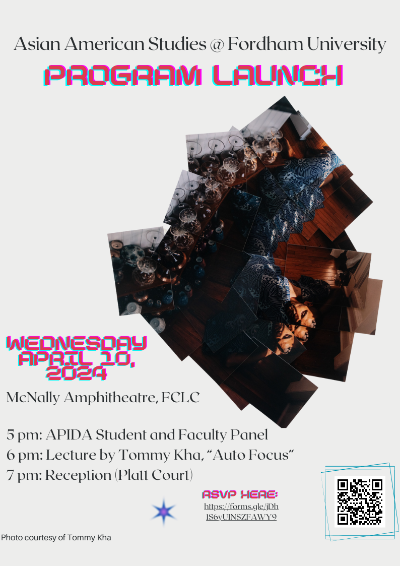Asian American Studies
In Asian American studies (AAST), students learn a variety of disciplinary and interdisciplinary methods for better understanding the lives of Asian American and Asian diasporic peoples, with particular attention to themes such as race, gender, sexuality, capital, and empire. In so doing, they grow into thoughtful citizen scholars informed by a global perspective and guided by an ethical commitment to social justice.
Fordham AAST students gain a knowledge base and a skill set valuable for careers in areas such as law, education, social work, health care, government, journalism, human rights, and community organizing. They also gain excellent preparation for graduate coursework in Asian American studies, as well as related fields such as history, literature, anthropology, and ethnic studies.
Advantageously located in New York City, home to the largest Asian American population in the continental United States, Fordham’s AAST program enjoys easy access to a wealth of Asian American community organizations and cultural institutions, including the Asian American Writers’ Workshop, Kundiman, the Museum of Chinese in America, Pan-Asian Repertory Theatre, and many others.
Students are particularly encouraged to participate in events at the Fordham Law School’s Center on Asian Americans and the Law. Founded in 2022 by Professor Thomas Lee and the Hon. Denny Chin, senior judge of the U.S. Court of Appeals for the Second Circuit, the center seeks to promote civic education, scholarly research, and public advocacy on Asian American legal issues.
Learning Goals
Upon completing the minor in Asian American studies at Fordham, students will
- understand fundamental concepts and disciplinary methods employed in Asian American studies, and know how to apply them thoughtfully and critically;
- understand major historical events that have shaped Asian racialization in western modernity, and know how to analyze their relevance to the contemporary moment;
- understand how Asian racialization relates to other forms of racialization, as well as other forms of social difference, and know how to analyze its role in broader social formations;
- know how to communicate their knowledge effectively so as to help empower Asian American and Asian diasporic communities, build meaningful coalitions among oppressed and/or marginalized social groups, and promote the cause of social justice;
- possess a global frame of reference, informed by an ethical commitment to social justice, for understanding and acting in the modern world.
AAST Program Launch

